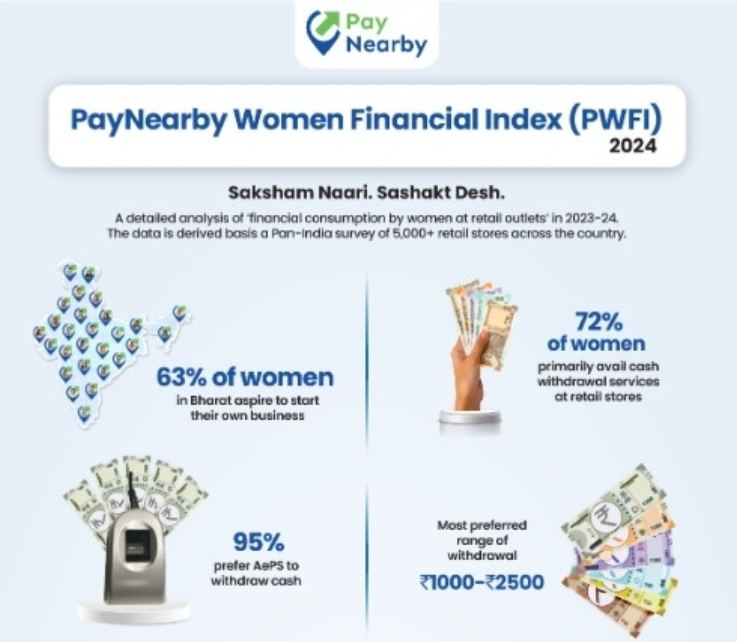Kolkata, 12 March 2024: PayNearby , reveals that 45% of women report availing benefits from government-backed schemes. Over 63% of women in Bharat aspire to start their own business, reflecting a strong desire for financial independence and self-reliance. This insight was shared as part of a Pan-India survey report titled "PayNearby Women Financial Index (PWFI),"
showcasing financial consumption by women at retail stores. The survey was conducted by the company among over 5,000 retail stores in the country recording financial transactions of women consumers as observed in those outlets.
The report highlights the preference for biometric authentication, with over 95% of female customers opting for AePS for cash withdrawal. While cash remains the favored mode of transaction, with 48% of women favoring it, Aadhaar-led transactions and UPI QR codes are gaining momentum in double digits. Cards continue to have a minimal presence in this segment. Notably, women aged 18-30, followed by 31-40, are the most digitally adept, showing a strong inclination towards financial transactions. Interestingly, 41% of women mentioned that they do not use any payment app on their phones.
Cash withdrawal, mobile recharges, and bill payments emerge as the top three services availed by women at PayNearby retail outlets. The most common withdrawal range falls between Rs 1000-2500, while EMI payments typically range from R 500-1000. The report reveals that 70% of women hold Jan-Dhan savings accounts primarily used for cash withdrawals. More than 25% of women admitted to their husbands managing their bank accounts instead of themselves.
Among the top three saving goals, 'child education' topped the list, followed by 'medical emergency' and 'buying household electronic items'. 54% of women indicated Rs 750-1000 as their preferred range for monthly savings, highlighting their approach towards financial planning. Notably, only 27% of the respondents preferred to save above Rs 1500 to accrue a corpus in the long run. 71% of women exhibited a higher inclination towards short-term investments, with savings tenure between 3-5 years. The report observes a marginal but noteworthy trend towards investment diversification, particularly in recurring and fixed goal-based deposits. This suggests an increasing awareness among women regarding alternative investment avenues, reflecting a growing interest in financial management and wealth creation.
Interestingly, 74% of women rely on their family members when making investment decisions, whereas 11% seek guidance from financial advisors. The financial advisors were typically women influences in their affinity. The survey also revealed that 16% of women were extremely aware, and 55% were moderately aware of various government schemes and initiatives related to financial well-being. Impressively, 45% of women report availing benefits from government-backed initiatives indicating a growing number of women availing these schemes.
Despite growing awareness of insurance products among women (29%), consumption remains low at 2%. 45% of women report benefiting from government-backed schemes. The survey indicates a willingness among 68% of women to take formal credit, emphasizing the need for affordable credit solutions. Women cited emergency expenses like medical bills, home repairs, and children’s education or for agricultural needs such as buying seeds, fertilizers, or equipment as reasons to avail credit.
The PWFI report also highlights the increasing adoption of online commerce (24%) and online entertainment (18%) among women. Online commerce saw a decent adoption among women at retail stores with daily groceries & household items (at 27%) being the most commonly ordered category. This was followed by clothing & accessories and home & kitchen items at 24% and 23%, respectively. It ratifies the fact that women at the last mile are aspirational and validates the latent demand for such services among them. Travel bookings and PAN card issuance have seen significant uptake, with 96% of the respondents showed a willingness to book a rail ticket from their nearby store. This showcases women's desire to become self-reliant and financially included.






0 Comments